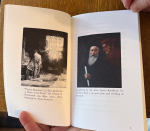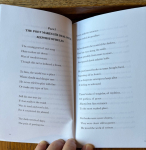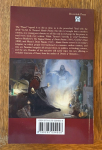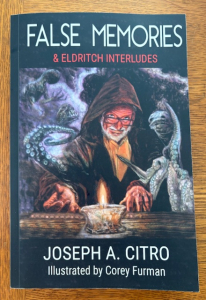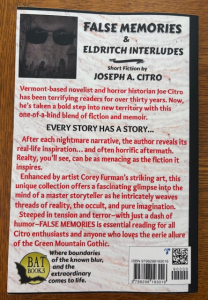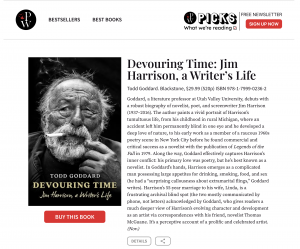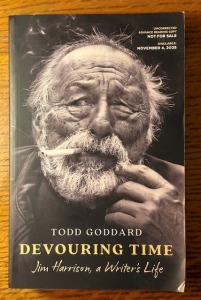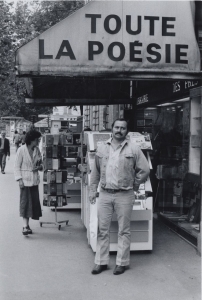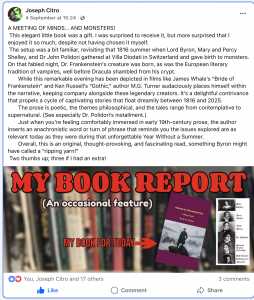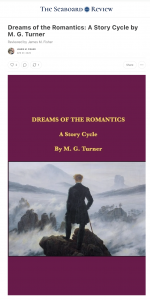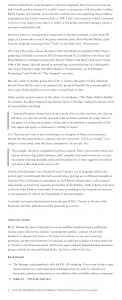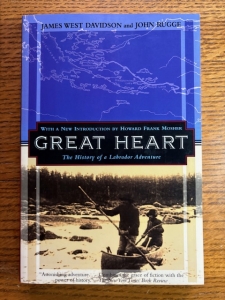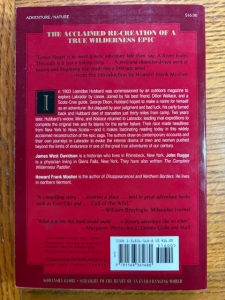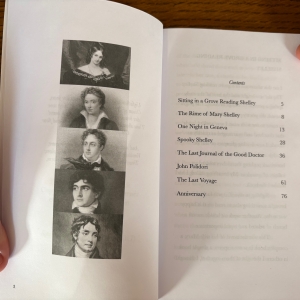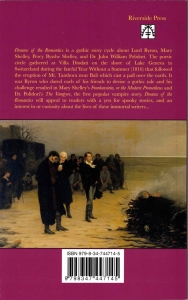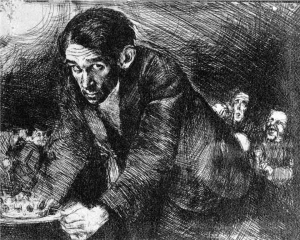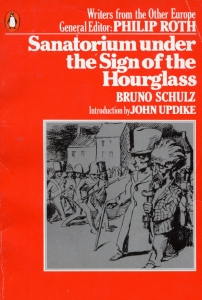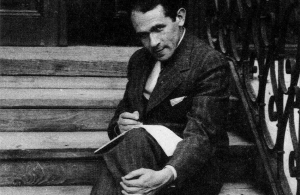For Halloween, “Reader Faustus: A Novella in Verse” by M. G. Turner
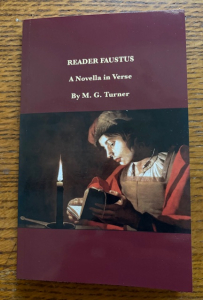 My dad and I share an affinity for the legendary literary character Faust, who in various retellings over the centuries has been depicted as selling his soul to the devil in exchange for a number of enticing rewards, including immortal life, admiration from the public, endless amounts of money, and much more. For Philip, this interest goes back to his student days, when with a professor named Donald Sheehan he took a course at Franconia College called “Faust,” and wrote a paper on the topic. Then a few years ago, I undertook the writing of what I call a “novella in verse” which retells the Faust legend for our modern times. With these materials in hand we decided to publish another in the series of chapbooks I’ve brought out this year under our Riverside Press imprint (preceded by Dreams of the Romantics and Roman Visions), using my pen name M. G. Turner. Collected with the narrative poem are two other devilish tales I’ve written, “The Tale of Hanns Drumpf” and “Johann Fust: Patron of Gutenberg,” plus Philip’s essay from 1974, “Faust: Man and Myth.” We believe all this writing goes well together and are now happy to announce publication of Reader Faustus: A Novella in Verse for Halloween. For those who would like to buy a copy from us directly before we begin distributing it online, we are selling them for 13 dollars plus 5 dollars shipping.
My dad and I share an affinity for the legendary literary character Faust, who in various retellings over the centuries has been depicted as selling his soul to the devil in exchange for a number of enticing rewards, including immortal life, admiration from the public, endless amounts of money, and much more. For Philip, this interest goes back to his student days, when with a professor named Donald Sheehan he took a course at Franconia College called “Faust,” and wrote a paper on the topic. Then a few years ago, I undertook the writing of what I call a “novella in verse” which retells the Faust legend for our modern times. With these materials in hand we decided to publish another in the series of chapbooks I’ve brought out this year under our Riverside Press imprint (preceded by Dreams of the Romantics and Roman Visions), using my pen name M. G. Turner. Collected with the narrative poem are two other devilish tales I’ve written, “The Tale of Hanns Drumpf” and “Johann Fust: Patron of Gutenberg,” plus Philip’s essay from 1974, “Faust: Man and Myth.” We believe all this writing goes well together and are now happy to announce publication of Reader Faustus: A Novella in Verse for Halloween. For those who would like to buy a copy from us directly before we begin distributing it online, we are selling them for 13 dollars plus 5 dollars shipping.
To learn a little more about our new title, here is the back cover copy:
The “Faust” legend is as old as time, as is the proverbial “deal with the devil.” In M. G. Turner’s Reader Faustus this idea is brought into a modern context, as a young poet chooses to sell his soul in exchange for the power to read every book ever written. While Turner’s “novella in verse” hearkens back to Marlowe’s The Tragical History of Doctor Faustus (1601), Goethe’s Faust (1808), and Mann’s Doctor Faustus (1947)—Reader Faustus zeroes in on today’s zeitgeist, in which people feel burdened to consume endless content, and who see Faustian bargains all around them, in politics, technology, science, and the arts. Readers of the macabre will surely enjoy this new offering, a veritable museum of Faust, from the author of Dreams of the Romantics.
I’m honored to have received two endorsements in advance of publication:
“The Faust legend is ever regenerative and ever redefined, as seen in M. G. Turner’s beguiling new verse tale Reader Faustus. In elegant, Augustan rhyming couplets, Turner tells the story of the devil’s bargain anew, but with a focus on the wages of modernity, when those who create are cursed by having to consume ever more content. Clever, thoughtful, and fun, Reader Faustus uses classical language to speak to very contemporary problems.”—Ed Simon, author of Devil’s Contract: The History of the Faustian Bargain, Public Humanities Special Faculty in the English Department of Carnegie Mellon University, and Editor of Belt Magazine
“M. G. Turner’s richly imaginative Reader Faustus offers a new twist on the devil’s bargain. In verse both erudite and playful, Turner asks us to reflect on what we might offer in exchange for our pursuit of both knowledge and enjoyment. While Turner takes glee in the use of antique language and form, the poem is also uncannily modern, as it proposes a complex relationship between the ability to consume content and the ability to create content—a relationship that is always under negotiation, and which has become particularly fraught in our digital age. As Turner’s work recognizes, the stakes for this bargain have never been higher.”—Brandon Grafius, author of Scared by the Bible: The Roots of Horror in Scripture
We hope you find the Faust legend as compelling as we do, and will be interested in visiting, and reading, our “veritable museum of Faust.” Please let us know!


